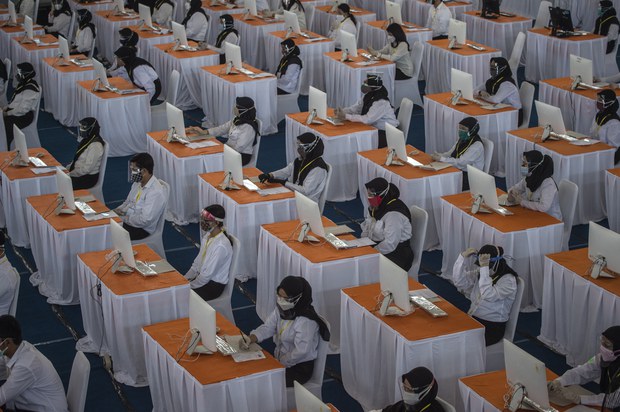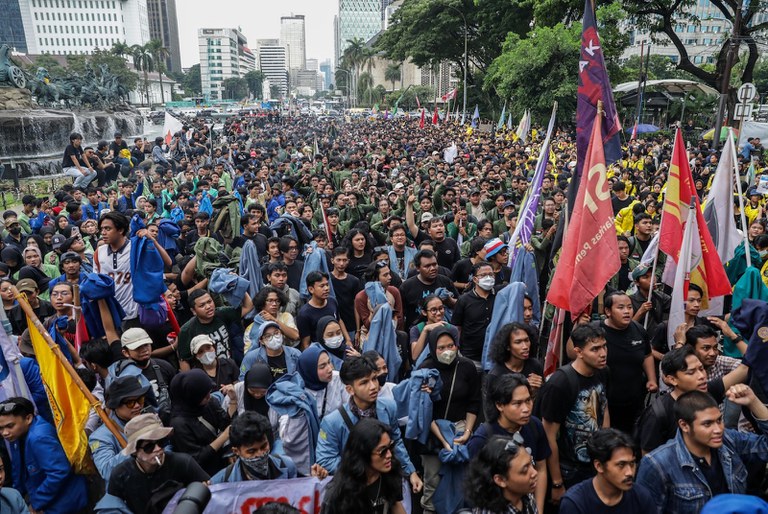Indonesian youths look abroad for better economic future
2025.02.19
Jakarta
 Young Indonesians take a test for civil servants in Surabaya, Sept. 20, 2021. In September 2024, local media reported that more than 3.5 million civil service aspirants took the test to fill a little over 250,000 positions.
Young Indonesians take a test for civil servants in Surabaya, Sept. 20, 2021. In September 2024, local media reported that more than 3.5 million civil service aspirants took the test to fill a little over 250,000 positions.
Nico Prakasa Anandadea, who recently earned a communications degree from a university in Yogyakarta hopes to land a job that would allow him to build a stable career.
After spending five months in Germany as an exchange student in 2022, the 24-year-old Indonesian has begun researching ways to return there – this time, for work and perhaps even permanent residency.
“The economic, social and political climate isn’t good here,” Nico told BenarNews.
Nico is not alone. Across Indonesia, young professionals are voicing their frustration over stagnant wages, limited job opportunities, and an uncertain economic future.
In recent weeks, their discontent has crystallized around a viral social media movement: #KaburAjaDulu (Just Escape First).
The hashtag has become a rallying cry for Indonesians who are thinking about leaving the country in search of better wages and career prospects abroad. For many, it’s not just about financial security but also about the lack of upward mobility and declining public services.
With a population of nearly 280 million, Indonesia, Southeast Asia’s largest economy, has long relied on a young and growing workforce as a key driver of development. Yet the country has struggled to create enough well-paying jobs for its educated workers.

Youth unemployment remains stubbornly high, reaching 17.32% for Indonesians aged 15 to 24 as of August 2024 – more than three times the national unemployment rate of nearly 5%, according to government statistics. Even for those who find jobs, low salaries, job insecurity, and poor labor protections make life difficult.
Meanwhile, neighboring countries such as Singapore and Australia offer higher wages, better working conditions, and clearer career advancement paths, making them attractive destinations for skilled Indonesian workers.
“It’s a sign of growing social anxiety, especially among young people,” El Bram Apriyanto, a researcher at the National Research and Innovation Agency (BRIN), told BenarNews.
“Lack of job opportunities, wages that don’t keep up with the cost of living, and economic uncertainty are driving young Indonesians to seek more stable lives abroad,” Apriyanto said.
The rise of #KaburAjaDulu comes at a time of heightened political and economic uncertainty.
President Prabowo Subianto, who took office in October, has initiated budget cuts, including reductions in funds for education and vocational training. Critics say such measures could further limit job prospects for young workers.
“Without guaranteed funding for public services, this will backfire on the government in the future,” Almas Sjafrina, a researcher at Indonesia Corruption Watch (ICW), a private watchdog, told a discussion on Wednesday.

PHOTO THREE
Meanwhile, Indonesia has been grappling with a wave of layoffs. As many as 80,000 workers lost their jobs in 2024, according to data from the Ministry of Manpower. That figure was higher than the previous year, which saw around 60,000 layoffs.
While Indonesia has long encouraged labor migration – millions of its citizens work abroad in construction, domestic work, and caregiving, especially in Malaysia, Hong Kong and the Middle East – experts note that this latest wave of interest in emigration is different.
“This is no longer about low-skilled workers looking for better pay,” said Dominique Nicky Fahrizal, a political analyst at the Centre for Strategic and International Studies (CSIS). “Now, it’s the educated middle class who want to leave.”
The Drone Emprit social media monitoring platform first detected #KaburAjaDulu on X (formerly Twitter) on Jan. 8, though it went viral six days later.
“Public frustration stems from multiple factors, including economic dissatisfaction, declining quality of life, social injustice, inadequate government policies, and hopes for a better future,” said Drone Emprit founder Ismail Fahmi.
RELATED STORIES
Indonesia’s austerity push sparks concern over public services, economic growth
Analysts: Ambitious Prabowo needs Sri Mulyani to sustain Indonesia’s hard-won fiscal credibility
Millions of young Indonesians eligible to vote, but will their voice count?
Luhut Pandjaitan, the head of the Indonesian Economic Council, a government advisory body, urged the public not to rush to criticize Prabowo’s administration, saying it was still in its early days.
“This government is only 100 days old. Let’s not be too hasty,” Luhut told reporters.
Deputy Manpower Minister Immanuel Ebenezer responded to the phenomenon with mocking indifference, telling reporters: “If you want to leave, just go. If possible, don’t come back.”
His response drew angry reactions from Indonesians.
“Do these people even think before they speak? If all the talented individuals leave, who will be left to run the country in the future? The bright minds that should be nurtured are choosing to go abroad – and yet, they make comments like this?” X user Adelina Sucipto wrote.

Rather than dismissing the trend, BRIN researcher Apriyanto argued that the government should support professionals working abroad as remittances from overseas workers contribute significantly to Indonesia’s economy.
“This could actually be more beneficial than relying solely on low-skilled migrant workers, who often face greater risks and social challenges,” he said.
Meanwhile, young Indonesians are actively seeking ways to turn their social media frustration into real opportunities abroad.
“Some of my friends have already asked me how to move to Germany,” said Citra Listya Rini, 40, an Indonesian student who has lived in Germany for two years.
“It makes sense. They likely have their own reasons or frustrations with life in Indonesia,” Citra said, adding that she had no plans to return home after finishing her studies.







